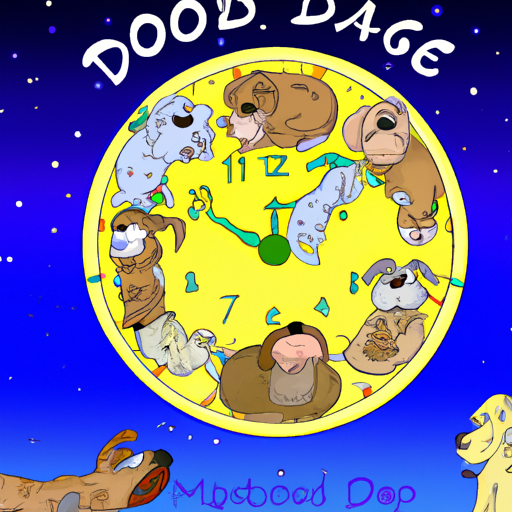Understanding Your Dog’s Sleep Pattern
As a caregiver, it’s essential to understand the sleep pattern of your beloved pet. Dogs, unlike their human companions, do not follow a straight eight-hour sleep schedule. Instead, their sleep is polyphasic, meaning they tend to sleep in multiple short bursts throughout the day. This is a natural behavior pattern inherited from their wild ancestors, who needed to wake often to check their surroundings for potential threats.
Factors Influencing a Dog’s Sleep Duration
The amount of sleep a dog needs can vary based on several factors:
- Age: Puppies and older dogs tend to sleep more than young and middle-aged dogs.
- Breed: Some breeds are more prone to sleep longer than others. For instance, large breeds like Mastiffs and Saint Bernards often sleep more than smaller breeds.
- Activity level: Active dogs who engage in regular exercise or work as service animals may require more rest to recover.
Typical Sleep Duration for Dogs
On average, dogs sleep for about 12-14 hours per day. However, this can fluctuate based on the factors mentioned earlier. Here’s a rough breakdown:
| Age/Breed/Activity Level | Average Sleep Duration |
|---|---|
| Puppies | 18-20 hours |
| Adult Dogs (Small breeds) | 12-14 hours |
| Adult Dogs (Large breeds) | 14-16 hours |
| Older Dogs | 16-18 hours |
| Working/Active Dogs | 14-16 hours |
What If My Dog Is Sleeping Too Much or Too Little?
You know your dog better than anyone else. If you notice a sudden change in their sleep pattern, it could be a sign of a health issue. For instance, excessive sleeping could indicate depression, diabetes, or hypothyroidism. On the other hand, insomnia or restlessness could be a sign of discomfort, pain, or anxiety.
How To Support Your Dog’s Sleep
Ensure your dog has a comfortable, quiet place to rest. Regular exercise and a healthy diet can also promote better sleep. Remember, variety is the spice of life. So, engage your dog in different activities to keep them mentally stimulated, which will help them sleep better.
FAQs
Q: My dog sleeps more than the average sleep duration mentioned. Should I be worried?
A: Not necessarily. If your dog is healthy, active, and does not show any signs of illness, they may just need more sleep. However, if you notice any other unusual behaviors or symptoms, it’s always a good idea to consult a vet.
Q: My dog seems restless at night. What can I do?
A: Try to establish a regular sleep schedule for your dog, including set times for meals, exercise, and bedtime. If restlessness continues, consult with a vet to rule out potential health issues.
Q: Can I use human sleep aids for my dog?
A: No, never give your dog human medication without consulting a vet. Some human medications can be harmful or even fatal to dogs.
Q: Is it okay for my dog to sleep in my bed?
A: It’s a personal decision. If you don’t mind and your dog is house-trained and free from fleas and ticks, it’s generally safe. However, it may lead to sleep disruptions for you or your dog.
Remember, understanding your dog’s sleep needs is a critical part of being a responsible caregiver. So, keep an eye on their sleep habits, provide a conducive environment for rest, and consult with a vet if you notice any sudden changes or problems.



